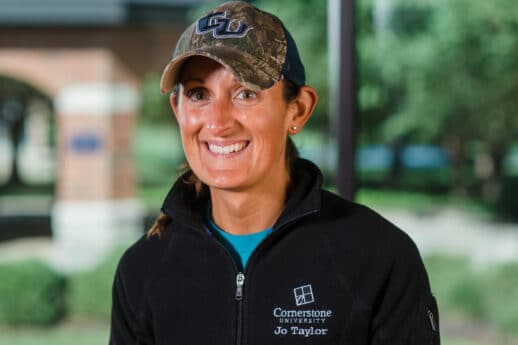Today’s job market looks different than it did a decade—or even a few years—ago. Through the “Great Resignation” phenomenon to ongoing position vacancies, job seekers are empowered to adapt and find a career they’re passionate about.
If you’re on the hunt for a new career opportunity that aligns with what inspires you, you’ll first need to go through the hiring process. From resume screenings to interviews, getting to the first day of your dream job will take time and effort. Be prepared and equipped for your next step in getting hired with these pro tips.
Hiring Experts Share Top Tips to Grow Your Career
Cornerstone University’s Professional & Graduate Studies division connected with hiring experts in a variety of fields to share helpful tips as you grow your career. Hear from PGS faculty members Steve Graham and Sara Parmeter who both serve in areas of human resources and employee engagement. Rachel VanderStelt, service and career development specialist at CU, also shared her insights into today’s dynamic market.
What is one way that employees and job seekers can develop a sense of purpose or find it in a new role?
Steve: When I work with clients, the desire to find more purpose in their career is often a strong desire. I have my clients write a personal mission and values statement. This helps to align their personal mission and values with organizations that seem to be a good fit for them.
Sara: Talk to people, learn their stories and work history, and ask for their opinions. Very often, a person’s career is not a straight line but rather a fascinating web of events, people, places and opportunities. While your career may not replicate theirs, their stories and insights can spark ideas and inspire your career journey. In addition, those people may be able to connect you to other people or companies that are the right fit for your skills and values.
Rachel: Now more than ever, purpose and meaning in a job is a top priority for employees. We are no longer interested in jobs that just pay the bills, although this is sometimes needed. It is vital employees know what their skills, interests, values and workplace preferences are. It is disappointing to get into a job where you feel stuck and don’t feel a sense of purpose. Work is not meant to be like that. God made us with different abilities and talents, and if we can find a place that aligns with our values (probably never 100% perfectly), work can be highly rewarding and enjoyable.
When someone is looking into exploring a new career or role within their current field, what is one important thing to keep in mind as they look to make that transition?
Steve: I’d encourage you to think through questions such as, does the new opportunity align with my purpose and values? Can the next move help me reach an ultimate career destination?
Sara: Be flexible! Talk to people who are established in that industry or career field and learn about their experiences. They will not only be able to paint a realistic picture of the role and why it motivates them, but can also direct you to areas you may have not otherwise considered based on their knowledge of the industry.
Rachel: In his book, “Redeeming Work,” author Bryan Dik emphasizes two ways that Christians can prepare for the many transitions they may experience in their careers: career adaptability and planned happenstance.
According to Dik, career adaptability is the “readiness and resources for coping with ‘tasks, transitions, and traumas’ in your career.” Unexpected things may happen in your career. It is vital that you are able to pivot to manage the change. Planned happenstance is knowing that the random events in your life may be leading to something that you cannot see or make sense of yet. God has a bigger plan. He just asks that you faithfully take the next step, even if you aren’t sure where that will lead you.
What characteristics do hiring managers or leaders look for in a candidate to hire or promote?
Steve: Characteristics that hiring managers look for in candidates include past experiences and the alignment of skills and talents with their needs. They also look for the capacity to learn and a commitment to professional development.
Sara: One general characteristic I look for is the eagerness to learn. Roles, companies and industries are constantly changing and what worked today may need to be tweaked or dramatically changed tomorrow. Always be open to considering new ideas.
Another characteristic I look for is an appreciation for others. No one person does it alone. If you can learn to appreciate the skills, knowledge and perspectives of others—even those you disagree with—you will be a strong team member, an inclusive leader and inspire the best in others.
Rachel: The National Association of Colleges and Employers (NACE) has grouped these top characteristics into eight core competencies, including career and self-development; communication; critical thinking; equity and inclusion; leadership; professionalism; teamwork; and technology. These are all traits that you can practice and improve no matter the discipline. The great news is that college students are constantly working on these characteristics. If you have a group presentation in a class, you are utilizing teamwork, communication skills, critical thinking, leadership, professionalism and technology all in one presentation.
What other advice would you share with someone looking to grow their career?
Steve: Be in control of your personal development. Do not rely on your employer to do everything. Seek out programs of interest, drive your development, and never stop learning.
Sara: Be willing to take chances. You will learn from every experience, interaction, role and opportunity. And sometimes you learn you never want to do that again! But be willing to take those chances.
Take the Next Step in Your Career
What career path inspires you? Be equipped to grow your career and make your next professional move. With a bachelor’s or master’s degree, you can gain fundamental skills with practical outcomes to empower you to thrive in the next step of your career. Get started today by learning more about our degree programs and determining which one is right for your career journey.
Dik, Bryan. (2020). Redeeming Work: A Guide to Discovering God’s Calling for Your Career. Templeton Press.












